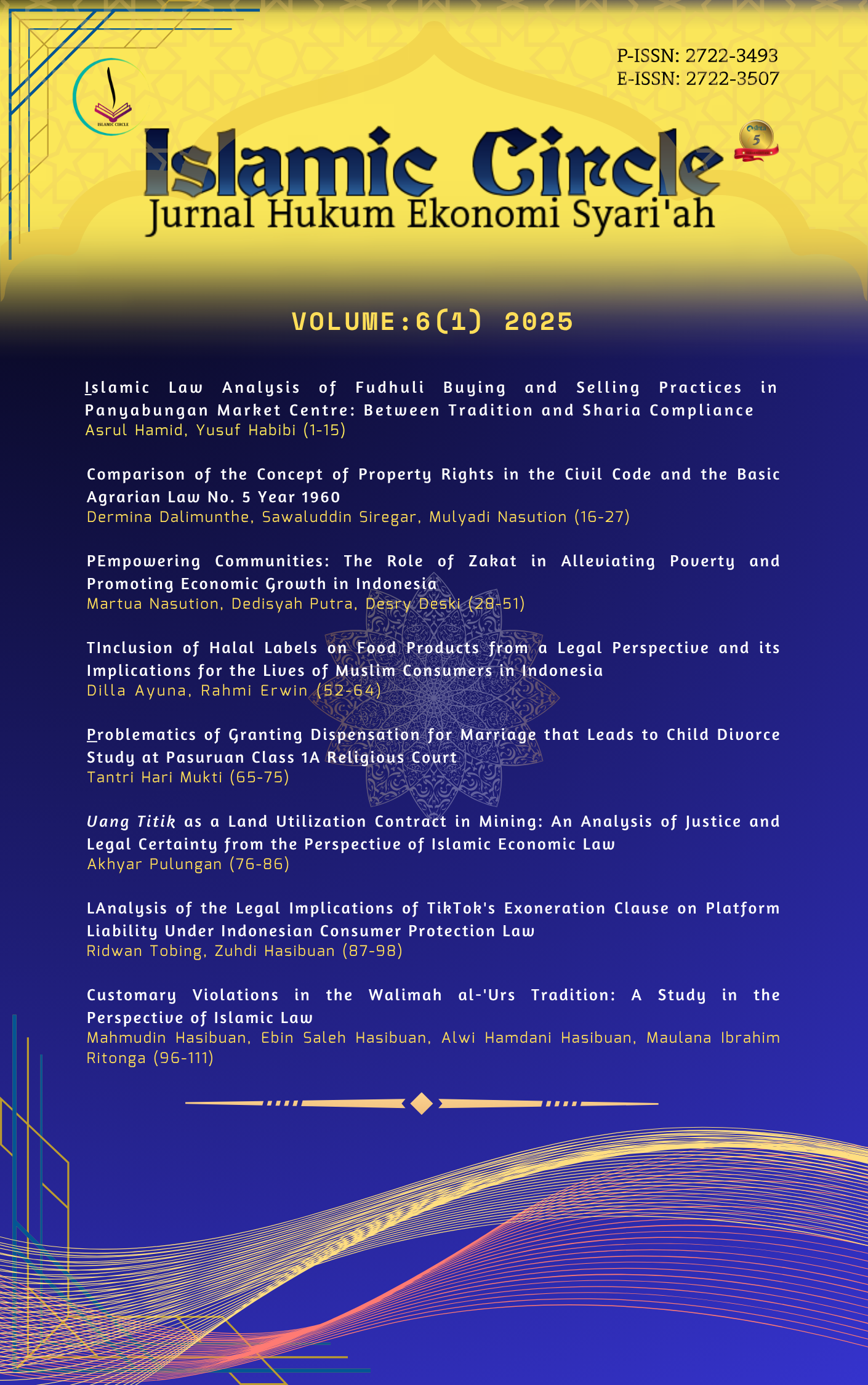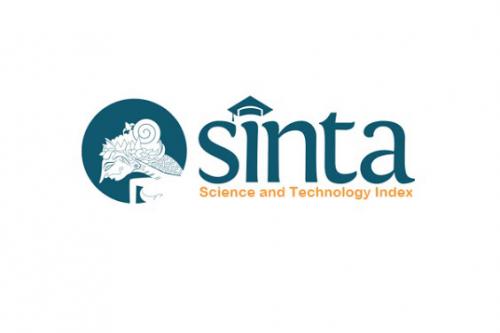Empowering Communities: The Role of Zakat in Alleviating Poverty and Promoting Economic Growth in Indonesia
DOI:
https://doi.org/10.56874/islamiccircle.v6i1.2257Keywords:
Zakat, economic empowerment, poverty alleviation, IndonesiaAbstract
Poverty remains a major development challenge in Indonesia despite various government programs. In this context, zakat as an Islamic economic instrument holds significant potential to address economic inequality and improve community welfare. However, the optimal utilization of zakat to support economic empowerment and development has yet to be fully realized. This study aims to analyze the role of zakat in alleviating poverty and promoting economic growth in Indonesia, as well as to identify obstacles and strategies for optimizing its management. This research employs a descriptive qualitative approach, utilizing literature review and secondary data analysis from zakat institutions’ reports, academic publications, and national statistics. Additionally, case studies were conducted on economic empowerment programs based on zakat implemented by several prominent zakat institutions in Indonesia. The findings indicate that zakat plays a significant role in increasing the income of zakat recipients (mustahik), expanding access to micro business capital, and encouraging economic self reliance. Productive zakat programs are proven to be more effective in the long term compared to consumptive zakat distribution. Nevertheless, challenges such as low zakat literacy, unequal distribution, and the lack of integration between zakat institutions and government programs remain key barriers. The study recommends enhancing collaboration among institutions, utilizing digital technology for zakat collection and distribution, and strengthening regulations and public education as strategies to maximize zakat's potential in national economic development.
Keywords: zakat, economic empowerment, poverty alleviation, Indonesia
References
Adnan, Nurul Ilyana Muhd, Muhammad Adib Che Roselam, Zahri Hamat, and Hafas Furqani. “The Distribution of Zakat Fund to the Poor Entrepreneurs Using Micro Finance.” International Journal of Academic Research in Business and Social Sciences 11, no. 2 (February 13, 2021). https://doi.org/10.6007/ijarbss/v11-i2/8666.
Amalia, Dela Nur, and Rahadi Nugroho. “PENGARUH KONSENTRASI PELANGGAN TERHADAP PENGHINDARAN PAJAK DENGAN BIAYA PERALIHAN DAN KEBERAGAMAN PENDAPATAN SEBAGAI MODERASI.” JURNAL PAJAK INDONESIA (Indonesian Tax Review) 5, no. 2 (December 13, 2021): 241–55. https://doi.org/10.31092/jpi.v5i2.1424.
Amelia, Silvia, and Siti Jamilah. “THE INFLUENCE OF INCOME LEVEL, RELIGIOSITY, AND SOCIAL ENVIRONMENT ON MUZAKKI’S DECISION TO PAY ZAKAT.” Jurnal Ekonomi Trisakti 2, no. 1 (April 20, 2022): 15–28. https://doi.org/10.25105/jet.v2i1.13552.
Anis, Fahami Muhammad, and Salina H. Kassim. “EFFECTIVENESS OF ZAKAT-BASED PROGRAMS ON POVERTY ALLEVIATION AND ECONOMIC EMPOWERMENT OF POOR WOMEN: A CASE STUDY OF BANGLADESH.” Journal of Islamic Monetary Economics and Finance 1, no. 2 (February 29, 2016): 229–58. https://doi.org/10.21098/jimf.v1i2.539.
Asmadia, Tezi, Ahmad Suryadi, and Sari Utami. “Zakat as a Poverty Alleviation Instrument: A Case Study in Indonesia and Malaysia 1*.” Vol. 1, 2005.
Choiriyah, Evi Aninatin Nimatul, Abdul Kafi, Irma Faikhotul Hikmah, and Imam Wahyudi Indrawan. “ZAKAT AND POVERTY ALLEVIATION IN INDONESIA: A PANEL ANALYSIS AT PROVINCIAL LEVEL.” Journal of Islamic Monetary Economics and Finance 6, no. 4 (September 15, 2020). https://doi.org/10.21098/jimf.v6i4.1122.
Dan, Ascarya, and Diana Yumanita. “ANALISIS RENDAHNYA PENGUMPULAN ZAKAT DI INDONESIA DAN ALTERNATIF SOLUSINYA,” n.d.
Departemen Agama, RI. Alquran Dan Terjemahan. Al-Qur’an Terjemahan, 2007.
Faisal, Faisal, Mukhlis Mukhlis, Jamaluddin Jamaluddin, Manfarisyah Manfarisyah, and Fitri Maghfirah. “Strengthening Zakat Rules in Indonesia: A Legal Study of the Law on the Government of Aceh.” Samarah: Jurnal Hukum Keluarga Dan Hukum Islam 7, no. 1 (March 31, 2023): 126. https://doi.org/10.22373/sjhk.v7i1.13993.
Febriyanti Nurhapsari, Rachma Dwi Jayanti, Rahmi Ramadhani, Ummu Salma Al Azizah. “The Role of Zakat for Poverty Alleviation in Indonesia.” In The 5th International Conference of Zakat (ICONZ) Proceeding. Jakarta, 2021.
Fikriyah, Khusnul, and Ahmad Ajib Ridlwan. “The Evaluation of Mustahiq Empowerment-Based Poverty Alleviation Program at Amil-Zakat Organizations.” International Journal of Islamic Business and Economics (IJIBEC), June 21, 2018, 65–73. https://doi.org/10.28918/ijibec.v2i1.1263.
Hafidhuddin, Didin. Zakat Dalam Perekonomian Modern - Didin Hafidhuddin. Gema Insani, 2002. https://books.google.co.id/books?hl=id&lr=&id=a6o2sAU07XkC&oi=fnd&pg=PA1&dq=zakat&ots=oA-9n9JPAw&sig=n1bo_Ura28fl9FSho6S6GAt039Q&redir_esc=y#v=onepage&q=zakat&f=false%0Ahttps://books.google.co.id/books?hl=id&lr=&id=a6o2sAU07XkC&oi=fnd&pg=PA1&dq=buku+tenta.
Hakim, Rahmad, and Rahmi Amalia. “Tren Dan Strategi Pengumpulan Dana Zakat, Infak Dan Sedekah (ZIS) Di Masa Pandemi Covid-19: Studi Multisitus Pada Badan Amil Zakat Nasional (BAZNAS) Kota Malang, Kabupaten Jombang Dan Kabupaten Tanah Laut, Kalimantan Selatan.” Jurnal Ilmiah Ekonomi Islam 9, no. 2 (July 21, 2023): 2431. https://doi.org/10.29040/jiei.v9i2.8036.
Harahap, Haddad Ulum, Dedisyah Putra, Muhadi Khalidi, Rahmat Linur, and Nuriza Acela. “The Study of Analysis Toward Zakat of Honey on Mazhab Imam Syafi’i Perspective.” Media Syari’ah?: Wahana Kajian Hukum Islam Dan Pranata Sosial 25, no. 2 (December 31, 2023): 312. https://doi.org/10.22373/jms.v25i2.17357.
Herianingrum, Sri, Indri Supriani, Raditya Sukmana, Effendie Effendie, Tika Widiastuti, Qudsi Fauzi, and Atina Shofawati. “Zakat as an Instrument of Poverty Reduction in Indonesia.” Journal of Islamic Accounting and Business Research 15, no. 4 (March 29, 2024): 643–60. https://doi.org/10.1108/JIABR-11-2021-0307.
Huda, Nurul, Nova Rini, Yosi Mardoni, Khamim Hudori, and Desti Anggraini. “Problems, Solutions and Strategies Priority for Waqf in Indonesia.” Journal of Economic Cooperation and Development. Vol. 38, 2017.
Husna, Asmaul, and Andri Soemitra. “Aghniya: Jurnal Ekonomi Islam Potential Of Zakat In Poverty Reduction In Indonesia: Literature Study” 4, no. 2 (2022).
Ihsan, Akmal, Armi Agustar, Azis Muslim, and Muhammad Adnan Azzaki. “Revitalization of The Collection of Zakat Funds in Indonesia: An Explanation from Yusuf Al-Qaradawi’s Fiqh Al-Zakah.” Journal of Islamic Economics Lariba 8, no. 2 (December 31, 2022): 303–12. https://doi.org/10.20885/jielariba.vol8.iss2.art10.
Imam Al-Ghazali. Ihya’ Ulumuddin?: Menghidupkan Ilmu-Ilmu Agama 2. Edited by Purwanto. Bandung: Penerbit Marja, 2016.
Khasanah, Miftakhul, Rizki Aminullah, and Dewi Setianingsih. “Determinants of Islamic Financial Literacy Index: Comparison Based on Ethnographic Studies in Yogyakarta, Indonesia.” Afkaruna: Indonesian Interdisciplinary Journal of Islamic Studies 18, no. 1 (July 26, 2022). https://doi.org/10.18196/afkaruna.v18i1.12584.
Lexi, J., and M M.A. Metodologi Penelitian Kualitatif. In Metodologi Penelitian Kualitatif. Rake Sarasin, 2010. https://scholar.google.com/citations?user=O-B3eJYAAAAJ&hl=en.
Muflih, Muhammad. “Muzakki’s Adoption of Mobile Service: Integrating the Roles of Technology Acceptance Model (TAM), Perceived Trust and Religiosity.” Journal of Islamic Accounting and Business Research 14, no. 1 (January 2, 2023): 21–33. https://doi.org/10.1108/JIABR-09-2021-0273.
Nasution, Muhammad Irfan, and Muhammad Andi Prayogi. “The Utilization of Zakah Productive towards Micro-Business Growth and Mustahik Welfare.” Jurnal Ekonomi Pembangunan: Kajian Masalah Ekonomi Dan Pembangunan 20, no. 1 (2019): 1–11. https://doi.org/10.23917/jep.v20i1.6576.
Pusvyta Sari. “Memotivasi Belajar Dengan Menggunakan E-Learning.” Ummul Quro 6, no. Jurnal Ummul Qura Vol VI, No 2, September 2015 (2015): 20–35. http://ejournal.kopertais4.or.id/index.php/qura/issue/view/531.
Putra, Dedisyah, and Jannus Tambunan. “Optiming the Role of Body Bather as a Priority for Zakat Al-Fitr Recipients in Sikilang, Sungai Aur Pasaman Barat.” Al-Risalah: Forum Kajian Hukum Dan Sosial Kemasyarakatan 22, no. 2 (2022). https://doi.org/10.30631/alrisalah.v22i2.1252.
Putra, Wahyu Manuhara, and Endah Dwi Lestari. “The Influence of Knowledge, Income Level, Transparency, and Trust in Muzakki’s Interest to Pay Zakat through The Zakat Organization Outside Java and Java Island,” 2022. https://doi.org/10.2991/aebmr.k.211225.017.
Qardhawi, Yusuf. Fikih Zakat, 2002.
Rahim Khamis, Mohd, Maryam Jameelah Hashim, and Azman Ab Rahman. “Assessing the Effectiveness Role of Zakat Management on Income Inequality in Selangor,” n.d. https://doi.org/10.33102/uij.vol36no03.604.
Rio Budi Dwitama, Tika Widiastuti. “PENGARUH INDIKATOR MAKROEKONOMI: INFASI DAN NILAI TUKAR RUPIAH TERHADAP JUMLAH ZAKAT TERKUMPUL DI LEMBAGA AMIL ZAKAT DOMPET DHUAFA PERIODE 1997-2013,” 2016.
Rizal, Rizal, Ruslan Abdul Ghofur, and Pertiwi Utami. “The Role of Muslim Generation Community at Zakat Collection on Realizing Sustainable Development Goals (SDGs) in the Era of Digital Society 5.0.” JURIS (Jurnal Ilmiah Syariah) 22, no. 1 (June 14, 2023): 105. https://doi.org/10.31958/juris.v22i1.6562.
Rosid, Abd. “Peran Zakat Produktif Dalam Pemberdayaan UMKM Di Era Kontemporer,” 2024.
———. “Peran Zakat Produktif Dalam Pemberdayaan UMKM Di Era Kontemporer,” 2024.
Sabiq, Sayyid. Fikih Sunnah. Jilid 12. Cairo-Mesir: Daar Ar-Risalah, 2000.
Sari, Dian Fitriarni, Irfan Syauqi Beik, and Wiwiek Rindayati. “Investigating the Impact of Zakat on Poverty Alleviation: A Case from West Sumatra, Indonesia.” International Journal of Zakat. Vol. 4, n.d.
Utami, Pertiwi, Basrowi Basrowi, and Muhammad Nasor. “Innovations in the Management of Zakat in Indonesia in Increasing Entrepreneurial Interest and Poverty Reduction.” IJISH (International Journal of Islamic Studies and Humanities) 4, no. 1 (March 1, 2021): 1. https://doi.org/10.26555/ijish.v4i1.1960.
Wahyuni, Tri, Mohammad Nuril Azizi, Fadllah Farah Diba, Moh Syaiful Anwar, Misbachul Munir, Sebastianus Priambodo, Yayu Sriwahyuni Hamzah, and Utami Puji Lestari. “UPAYA MENUMBUHKAN JIWA SOLIDARITAS DAN SPORTIFITAS MELALUI KEGIATAN LOMBA 17 AGUSTUS ANTAR RT DI DESA KEBON AGUNG SUKODONO SIDOARJO,” n.d.
Zahara, Hanifatus Syaidah, Meisya Zahra, Arini Prawita, Silvia Zahra Syahidah, and Elis Nurhasanah. “Akuntabilitas Dan Transparansi Lembaga Pengelola Zakat Melalui Zakat Core Principles Dan PSAK 109.” Jurnal Mutiara Ilmu Akuntansi 1, no. 3 (June 3, 2023): 31–43. https://doi.org/10.55606/jumia.v1i3.1461.
Zakiy, Faris Shalahuddin, Falikhatun Falikhatun, and Najim Nur Fauziah. “Sharia Governance and Organizational Performance in Zakat Management Organization: Evidence from Indonesia.” Journal of Islamic Accounting and Business Research, November 17, 2023. https://doi.org/10.1108/JIABR-06-2023-0188.
Zawawi, Zawawi. “Reaktualisasi Zakat Di Era Modern,” 2020. http://repository.uingusdur.ac.id/196/.











